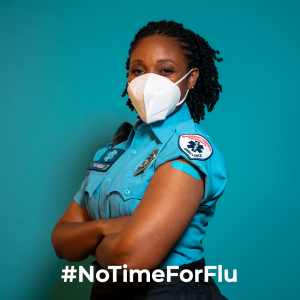Navigating Flu during COVID-19
Be Sure to Get Your Shot This Flu Season!
By: Allison Kozicharow; Edited by Elizabeth Fine
Getting an influenza shot is more important than ever to protect yourself, your family and your community from flu — especially during the COVID-19 pandemic.
What is the difference between the flu and COVID-19? Both are contagious respiratory illnesses, and, although they share many symptoms, they are caused by different viruses — flu from influenza viruses and COVID-19 from the new SARS-CoV-2 virus.
The flu and COVID-19 viruses are now spreading at the same time. Co-circulation could place a tremendous burden on healthcare systems and result in many illnesses, hospitalizations and deaths. There is no vaccine for COVID-19 yet. Until a safe vaccine is available, getting a flu vaccine is a critical and easy way to protect yourself at least from getting the flu.
What are some benefits of seasonal flu vaccination? Research shows that the vaccine:
- Can keep you from getting sick with flu.
- Can reduce the risk of flu-associated hospitalization for children, working age adults, and older adults.
- Is an important preventive tool for people with chronic health conditions.
- Helps protect women during and after pregnancy and reduces the risk of flu-associated acute respiratory infection in pregnant women by about one-half.
- Can be lifesaving in children.
- May also protect people around you.
(Note that there is also a high-dose vaccine for people ages 65 and older, who are at the highest risk for flu–related complications and deaths.)

WiRED International recommends that everyone get a flu shot this season, continue to hand wash frequently and practice social distancing until a safe vaccine for COVID-19 is available. And wear your mask!
Note: For information and free health training on COVID-19 and the flu, WiRED encourages you to check out our module series — The Coronavirus Threat: Key Topics in Infection Control. This package covers COVID-19, coping with stress during the outbreak, how the immune system works, airborne diseases as well as related topics such as pneumonia, upper respiratory tract infections AND influenza.
Frequently Asked Questions about Flu and COVID-19
If coronavirus is spreading in my community, should I still go out and get a flu vaccine?
Yes. Getting a flu vaccine is an essential part of protecting your health and your family’s health this season. To protect your health when getting a flu vaccine, follow CDC’s recommendations for running essential errands and doctor visits. Continue to take everyday preventive actions.
Does a flu vaccination increase my risk of getting COVID-19?
There is no evidence that getting a flu vaccination increases your risk of getting sick from a coronavirus, like the one that causes COVID-19.
Can I have flu and COVID-19 at the same time?
Yes. It is possible have flu, as well as other respiratory illnesses, and COVID-19 at the same time.
Is there a test that can detect both flu and COVID-19?
Yes. CDC has developed a test that will check for A and B type seasonal flu viruses and SARS CoV-2, the virus that causes COVID-19.
Should a flu vaccine be given to someone with suspected or confirmed COVID-19?
No. Vaccination should be deferred (postponed) for people with suspected or confirmed COVID-19, regardless of whether they have symptoms, until they have met the criteria to discontinue their isolation.
Source: CDC


